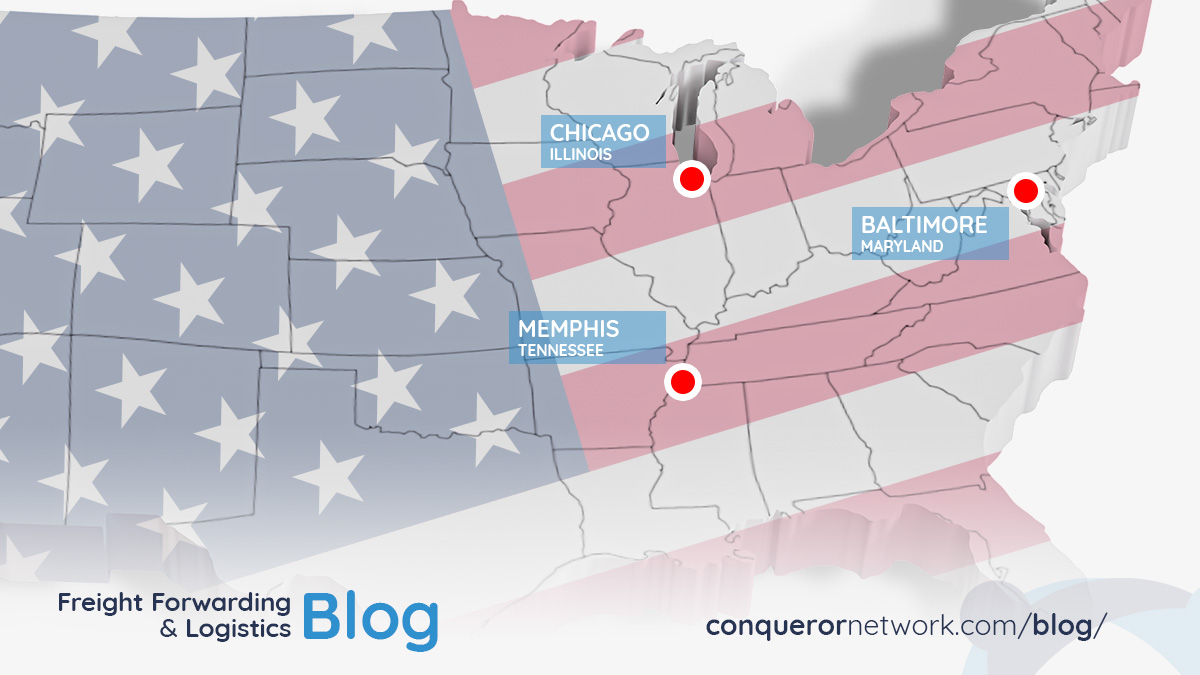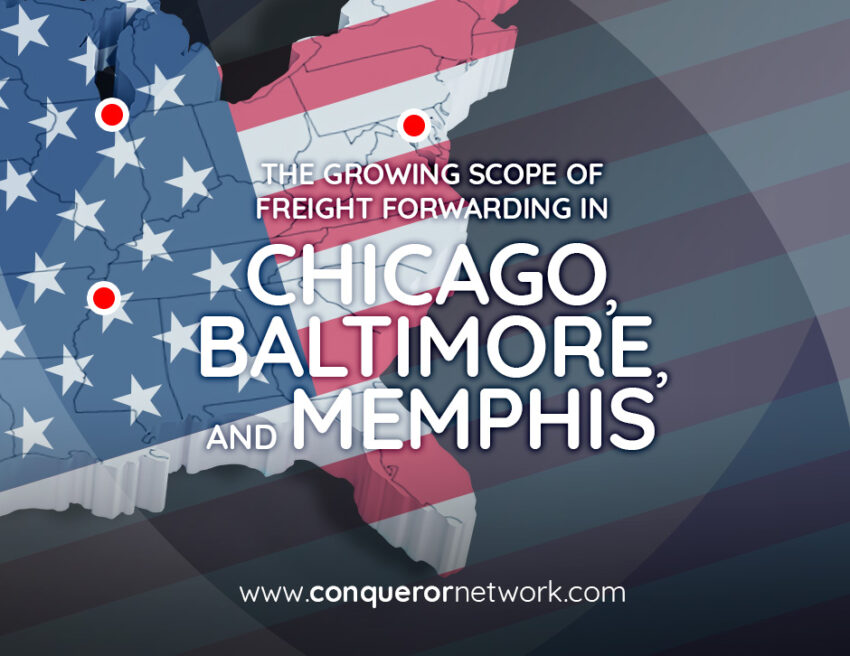As global supply chains evolve and adapt to rising consumer demands, geopolitical shifts, and digital transformation, some U.S. cities have quietly solidified their place as logistics powerhouses. The current landscape offers tremendous opportunities for freight forwarders operating in Chicago, Baltimore, and Memphis, provided they have the right tools, partners, and strategies to scale up. These three cities, each uniquely positioned in terms of geography, infrastructure, and specialization, are playing increasingly central roles in the movement of goods both domestically and internationally. And for independent freight forwarders looking to compete with multinational logistics companies, building a strong global network of reliable partners is becoming not just beneficial, but essential.
Let’s take a closer look at the logistics strengths of Chicago, Baltimore, and Memphis—and how freight forwarders in these cities can position themselves for long-term growth.

Chicago: The crossroads of America
Often referred to as the transportation and logistics capital of the U.S., Chicago’s central location makes it a key player in the nation’s freight economy. It is the only city in the country where six of the seven Class I railroads converge, making it a vital hub for intermodal traffic. A vast highway network also serves Chicago and is within a one-day truck drive to nearly half the U.S. population.
On the air cargo side, O’Hare International Airport (ORD) ranks among the busiest cargo airports in North America, handling over 2 million metric tons of freight annually. For sea freight, while not a port city itself, Chicago’s proximity to major ports like New Orleans and New York allows it to play a major role in inland distribution and containerized cargo movement. For freight forwarders in Chicago, the market is filled with opportunities—from managing intermodal cargo flows to coordinating time-critical shipments via air. However, with this opportunity comes steep competition, not just locally but from global players with well-established networks.
To thrive in this highly active hub, forwarders need strong international partnerships to offer seamless end-to-end solutions. Joining a trusted freight network that connects them with reliable agents worldwide can dramatically enhance their service portfolio and credibility in such a competitive market.
Baltimore: Port power meets East Coast access
Baltimore, Maryland, has been growing steadily as a preferred logistics gateway on the East Coast. The Port of Baltimore is one of the deepest ports in the U.S. and is well-known for handling high volumes of breakbulk and Ro-Ro cargo, including automobiles and heavy machinery. In recent years, it has also improved its capacity for handling containerized cargo thanks to significant infrastructure investments.
In addition to its port facilities, Baltimore enjoys proximity to Washington, D.C., Philadelphia, and New York City, giving it strategic access to key population centers and government entities. It’s also connected to the CSX and Norfolk Southern rail networks and sits on several major interstate highways.
For freight forwarders, Baltimore offers unique strengths, especially for companies that specialize in project cargo, machinery, and high-value vehicles. However, standing out in a port city dominated by established logistics conglomerates can be challenging.
This is where global freight forwarding collaboration becomes a critical growth lever. By working with like-minded agents around the world, forwarders in Baltimore can offer integrated services, from customs clearance to last-mile delivery abroad. Being part of a reputable freight network allows them to meet international demands without needing to build overseas infrastructure from scratch.
Memphis: America’s Air Cargo Capital
While not a coastal city, Memphis, Tennessee, has earned a name for itself as the air cargo capital of the U.S. It is home to the FedEx Express World Hub, one of the largest cargo handling facilities in the world. The city’s Memphis International Airport (MEM) ranks consistently among the top airports globally in terms of total cargo volume.
What sets Memphis apart is its ability to serve as a high-speed distribution center. Its strategic location—within 600 miles of 70% of the U.S. population—makes it an ideal point for time-sensitive shipments, including e-commerce, pharmaceuticals, and perishables. Memphis also benefits from five Class I railroads, the Mississippi River port system, and a robust trucking network. For freight forwarders based here, the city offers unrivaled potential to cater to express and next-day delivery demands.
However, with the dominance of FedEx and other large integrators, many smaller forwarders may feel overshadowed. To gain a competitive edge, they must offer something bigger players can’t: personalized service, flexibility, and global reach through trusted partnerships. A well-structured international freight network can provide that reach. It allows Memphis-based forwarders to expand their air freight services globally while remaining agile and client-focused—an advantage that larger logistics corporations often struggle to maintain.
Why freight forwarders in these cities need a global network
While each city, Chicago, Baltimore, and Memphis, has its unique strengths, they all share one challenge: navigating the increasingly global and interconnected world of logistics. Clients are no longer content with regional shipping solutions. Whether it’s a manufacturer in Illinois looking to ship to Southeast Asia or a medical supplier in Maryland distributing products to Africa, forwarders are expected to offer reliable, end-to-end, international service.
But for many independent companies, building a network of trusted overseas partners is easier said than done. It takes time, resources, and a level of risk that many can’t afford. This is where joining a reliable freight network becomes a game-changer. A network like Conqueror Freight Network brings together carefully vetted freight forwarders from around the world, each with proven expertise, local knowledge, and a commitment to cooperation.
Members benefit from:
-
Exclusive representation in their territories
-
A cutting-edge platform for instant quote generation
-
Annual meetings that facilitate real partnerships
-
Inward business from other members needing a local partner
- Reliable and vetted logistics partners across 250 cities in 134 countries
For forwarders in Chicago, Baltimore, or Memphis, becoming part of such a network means transforming from a regional service provider to a globally connected logistics expert.
Final thoughts
The logistics industries in Chicago, Baltimore, and Memphis are thriving, fueled by strategic geography, infrastructure, and demand. But to fully capitalize on the opportunities in these markets, freight forwarders must think beyond city limits. A trusted international freight network is more than just a directory—it’s a platform for real collaboration, increased visibility, and business growth. If you’re a forwarder based in one of these logistics hubs and you’re ready to expand your global reach, enhance your capabilities, and compete on equal footing with the largest players in the industry, then it may be time to join a network that’s built to empower your future.


